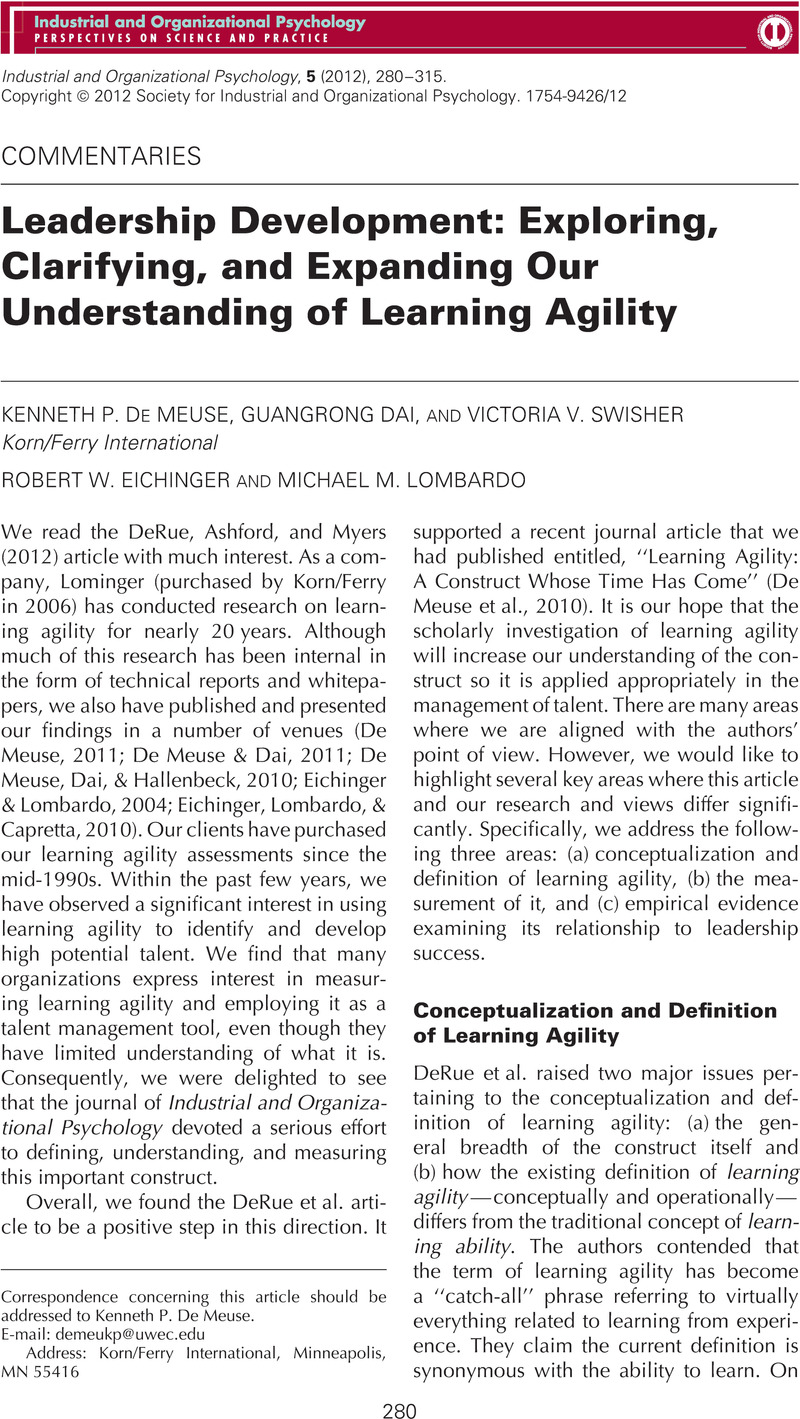Crossref Citations
This article has been cited by the following publications. This list is generated based on data provided by Crossref.
DeRue, D. Scott
Ashford, Susan J.
and
Myers, Christopher G.
2012.
Learning Agility: Many Questions, a Few Answers, and a Path Forward.
Industrial and Organizational Psychology,
Vol. 5,
Issue. 3,
p.
316.
전소영
and
Kim Jin-Mo
2015.
HRD practitioners' perception on deliberate practice.
Journal ofAgricultural Education and Human Resource Development,
Vol. 47,
Issue. 1,
p.
183.
류혜현
and
Oh,Hun-Seok
2016.
Learning agility: Issues and Challenges.
The Korean Journal of Human Resource Development Quarterly,
Vol. 18,
Issue. 4,
p.
119.
Medcof, John W.
2017.
Leadership development: Towards a more systematic approach in technology management.
The Journal of High Technology Management Research,
Vol. 28,
Issue. 2,
p.
167.
Im, Changhyun
이효선
and
WEE YOUNG EUN
2017.
A study on the development of the learning agility scale.
The Korean Journal of Human Resource Development Quarterly,
Vol. 19,
Issue. 2,
p.
81.
Terramorsi, Patrice
Fabiani, Thierry
and
Albertini, Thérèse
2018.
De l’expertise à l’audace : comprendre les représentations pour développer les talents.
Question(s) de management,
Vol. n° 20,
Issue. 1,
p.
89.
Bozer, Gil
and
Delegach, Marianna
2019.
Bringing Context to Workplace Coaching: A Theoretical Framework Based on Uncertainty Avoidance and Regulatory Focus.
Human Resource Development Review,
Vol. 18,
Issue. 3,
p.
376.
박정열
and
Kim Jin-Mo
2019.
The Development of Workplace Learning Agility Assessment Inventory for Knowledge Workers.
The Korean Journal of Human Resource Development Quarterly,
Vol. 21,
Issue. 4,
p.
115.
Bywater, James
Hezlett, Sarah
Lewis, James
and
Owen, Catrin
2020.
Learning agility in a high change world.
Assessment and Development Matters,
Vol. 12,
Issue. 2,
p.
3.
Barinova, E. P.
Sheremetyeva, E. N.
and
Zotova, A. S.
2020.
Digital Age: Chances, Challenges and Future.
Vol. 84,
Issue. ,
p.
327.
Deepa, V.
Sujatha, R.
and
Baber, Hasnan
2021.
Ageing and Learning Agility –Mediating role of learning perception and Moderating role of technology leverage.
International Journal of Lifelong Education,
Vol. 40,
Issue. 5-6,
p.
514.
Kim, Gayoung
and
Lee, Woo Jin
2021.
The Venture Firm’s Ambidexterity: Do Transformational Leaders Boost Organizational Learning for Venture Growth?.
Sustainability,
Vol. 13,
Issue. 15,
p.
8126.
Bouland-van Dam, Sophie I. M.
Oostrom, Janneke K.
De Kock, François S.
Schlechter, Anton F.
and
Jansen, Paul G. W.
2021.
Unravelling leadership potential: conceptual and measurement issues.
European Journal of Work and Organizational Psychology,
Vol. 30,
Issue. 2,
p.
206.
Setiadi, Nugroho J.
Christianto, Alvendo
and
Sutanto, Harry
2022.
The Effectiveness of Digital Culture and Online Training in Improving Learning Agility of Bank Employees as an Adaptation Step to the Covid-19 Pandemic (Empirical Study on a Branch of Commercial Bank).
p.
01.
Bouland-van Dam, Sophie I. M.
Oostrom, Janneke K.
and
Jansen, Paul G. W.
2022.
Development and validation of the leadership learning agility scale.
Frontiers in Psychology,
Vol. 13,
Issue. ,
Lee, Jinju
and
Song, Ji Hoon
2022.
Developing a measurement of employee learning agility.
European Journal of Training and Development,
Vol. 46,
Issue. 5/6,
p.
450.
Lee, Jinjoo
and
Song, Ji Hoon
2022.
Developing a Conceptual Integrated Model for the Employee's Learning Agility.
Performance Improvement Quarterly,
Vol. 34,
Issue. 4,
p.
367.
Özgenel, Mustafa
Yazıcı, Şebnem
and
Asmaz, Adem
2022.
The Mediator Role of Organizational Justice in the Relationship Between School Principals’ Agile Leadership Characteristics and Teachers’ Job Satisfaction.
Frontiers in Psychology,
Vol. 13,
Issue. ,
Rose, Elizabeth S.
Rabin, Tracy L.
Samaan, Jenny
Hudspeth, James C.
Ibrahim, Layan
Azain, Maria Catalina Padilla
Evert, Jessica
and
Eichbaum, Quentin
2022.
COVID-19 Pandemic Impact on Academic Global Health Programs: Results of a Large International Survey.
Annals of Global Health,
Vol. 88,
Issue. 1,
p.
84.
Conway, Deirdre M.
2022.
Leadership and Followership in an Organizational Change Context.
p.
90.



